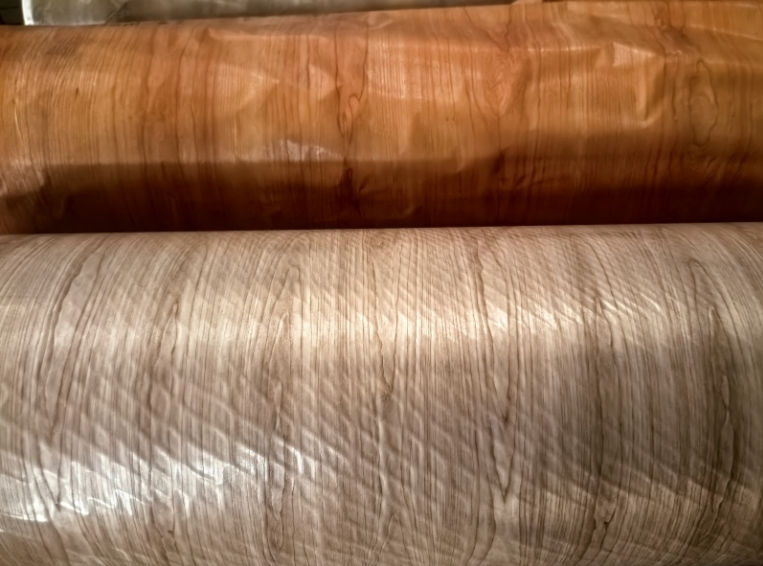May. 06, 2025
Wood grain transfer film is a specialized sublimation material used to apply a realistic wood appearance onto powder-coated metal surfaces. This innovative decorative solution offers the beauty of wood with the durability of metal, making it a popular choice in architectural aluminum, steel furniture, automotive parts, home appliances, and construction components.
As industries increasingly prioritize aesthetic value without compromising longevity or environmental resistance, wood transfer films are becoming an essential surface finishing material.

The core principle behind wood grain transfer film is sublimation—a process in which solid dye pigments on the film are transformed into gas under heat and pressure and then absorbed into a pre-coated substrate.
Base Powder Coating: The metal surface is first coated with a light-colored polyester powder coating (commonly beige, white, or light brown) and cured in an oven.
Application of the Transfer Film: A printed wood transfer film is tightly wrapped or vacuumed around the cured object.
Vacuum and Heat Transfer: The object enters a sublimation oven or is placed in a vacuum heat transfer machine. Heat (usually 180–200°C) is applied for several minutes.
Sublimation Occurs: The wood pattern on the film sublimates into the powder coating layer, bonding permanently with the surface.
Film Removal: After cooling, the film is peeled off, leaving behind a vivid, durable wood grain finish.
This method ensures deep penetration of the pigments, resulting in exceptional wear resistance, UV stability, and moisture protection.
Aesthetic Realism
Modern wood grain transfer films can mimic oak, walnut, teak, cherry, and even exotic woods with incredible accuracy—offering luxurious appearance without deforestation or expensive raw materials.
Superior Durability
The powder-coated base offers corrosion resistance, weather protection, and impact resistance. When combined with transfer film, the product resists peeling, fading, and warping even in outdoor applications.
Eco-Friendly and Low Maintenance
Unlike natural wood, there’s no need for staining, varnishing, or termite treatments. The film is VOC-free and suitable for green building certifications.
Cost-Effective Alternative to Natural Wood
Wood imitation finishes are significantly more affordable in the long term than real wood, especially for commercial-grade applications like curtain walls, fencing, gates, or façade panels.
Aluminum profiles for windows, doors, and curtain walls
Decorative wall cladding and façade panels
Handrails and balcony systems
Steel or aluminum furniture frames
Cabinet and drawer handles
Lighting fixture components
Vehicle roof rails
Trim and interior decorative panels
Recreational vehicle components
Handles, covers, and structural parts of ovens, air conditioners, and grills
Garden tool components needing aesthetic appeal and durability
Film Quality and Print Definition
Look for high-definition printing technology with fine color gradients and realistic texture representation. Poor-quality films can cause ghosting, blur, or color distortion.
Compatibility with Powder Coating
Ensure the film matches the chemical and thermal properties of the powder coating. Polyester-based coatings are the most compatible.
Heat Stability and Sublimation Performance
The film must be able to withstand high heat (typically around 200°C) without shrinking or breaking down prematurely during vacuum heating.
UV and Weather Resistance
Especially for outdoor-use products, choose films that are tested for UV fading and weather degradation.
Film Width and Length Customization
Large or irregular shapes may require roll-to-roll film options or custom-cut dimensions. Some suppliers provide flexible size options for different production needs.
| Feature | Vacuum Sublimation | Manual Wrapping Heat Press |
|---|---|---|
| Transfer Quality | High, uniform penetration | Medium, depends on skill |
| Productivity | Suitable for mass production | Better for small batches |
| Equipment Cost | High initial investment | Lower cost |
| Shape Flexibility | Ideal for complex geometries | Limited to flat/simple shapes |
Eco-Ink Developments: Water-based pigment inks and solvent-free formulations are being developed to further reduce environmental impact.
Digital Printing Transfer Films: Custom one-off prints or small batches are now possible with digital wood grain film printing, making personalization more viable.
Anti-Fingerprint and Matte Surface Films: Enhancements like anti-smudge coatings, matte finishes, and even tactile texture simulation are gaining popularity in high-touch applications.
Thermoformable Films for 3D Applications: Some films can now stretch slightly to conform to curves and embossed patterns, expanding their use in complex architectural elements.
| Challenge | Solution |
|---|---|
| Wrinkles or air bubbles during transfer | Use vacuum systems or tension-controlled rollers |
| Color fading under sunlight | Choose UV-resistant, outdoor-grade films |
| Blurry or double patterns | Ensure proper adhesion, pressure, and timing |
| Poor adhesion on sharp corners | Use pre-heating and tension management |
Wood grain transfer finishes on powder-coated substrates require minimal upkeep. Use mild detergents for cleaning. Avoid abrasive tools or solvents. Properly applied, these finishes can last 10–15 years outdoors, and even longer in indoor environments.
Wood grain transfer film for powder-coated surfaces is a breakthrough decorative technology that blends aesthetics with performance. It enables architects, designers, and manufacturers to achieve the timeless look of wood—without the vulnerabilities of organic material.
Whether for building façades, furniture, or equipment parts, sublimation film solutions are redefining modern surface design with eco-conscious and budget-friendly options.
For high-quality wood grain transfer film and precision powder-coating compatibility, trust NB Technology—your reliable partner for advanced surface finishing solutions.
Navigation
+86 158 1691 5404
+86 757 8271 3937
+86 757 8271 3937
No. 10 Industry Huacongsiyue Village, Shishan Town, Nanhai District, Foshan, Guangdong Province, China